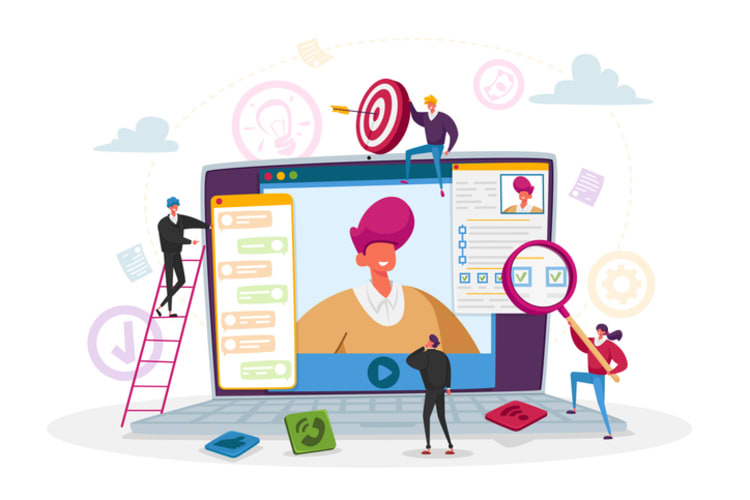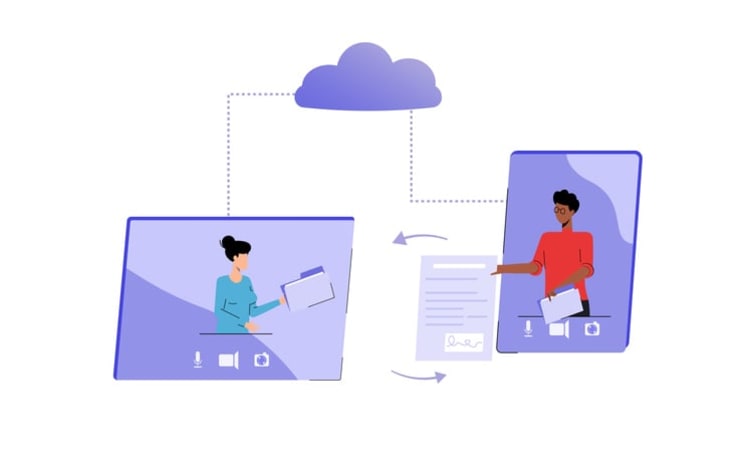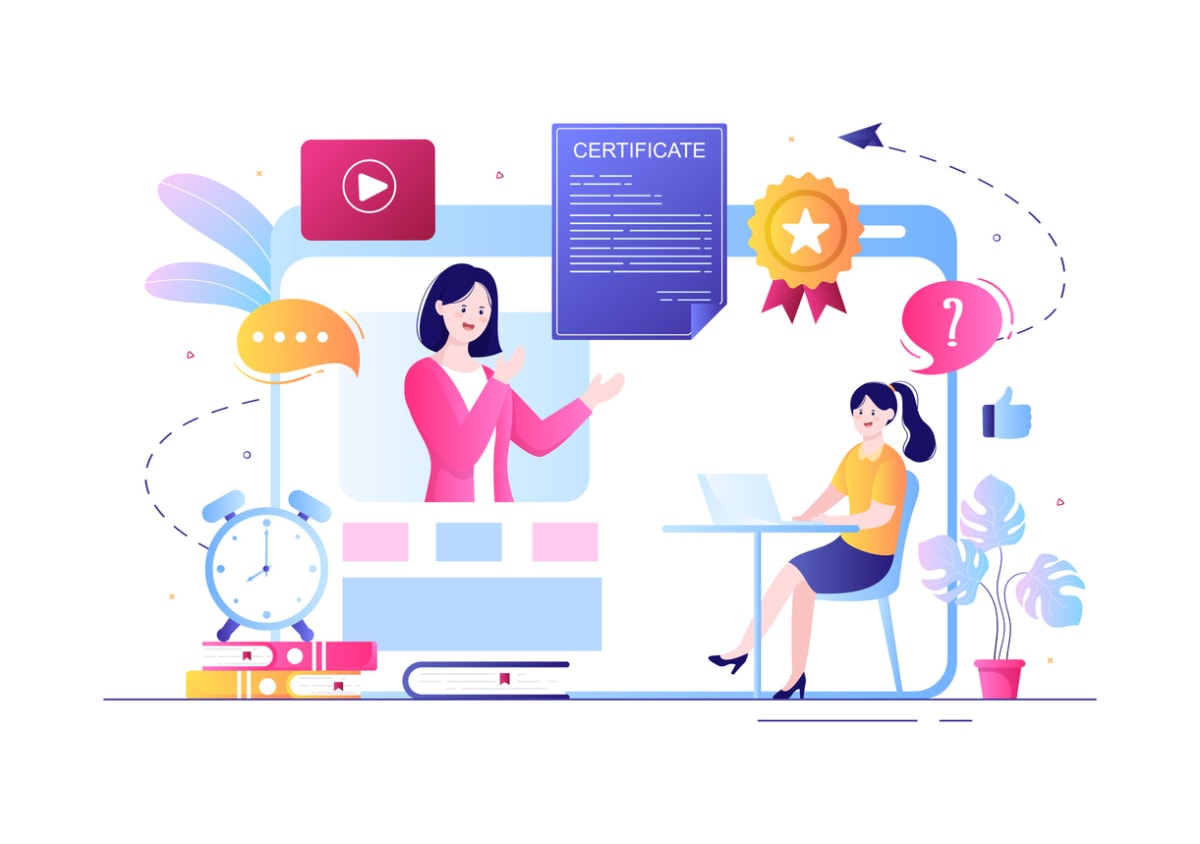Imagine a world where you can connect with employers from the comfort of your own home, explore new job opportunities, and expand your professional network – all without having to step foot in a crowded convention hall. Welcome to the exciting realm of the virtual career fair! These innovative online events are revolutionizing the job search process, offering unique advantages for both job seekers and employers. In this comprehensive guide, we’ll delve into the world of virtual career fairs and provide you with the tools you need to maximize your success.
Key Takeaways
- Maximize your virtual career fair success with preparation, a standout profile, and networking.
- Master virtual communication etiquette to make a lasting impression on potential employers.
- Follow up after the event and stay connected through social media for increased job opportunities!
Understanding virtual career fairs

Virtual career fairs are online events where job seekers and employers connect and explore new opportunities, all from the convenience of their own devices. The purpose of hosting virtual career fairs is to facilitate exciting opportunities for employers, universities, and member organizations to connect with promising talent, no matter where they are located. The benefits of such virtual events are nearly endless and incredibly exciting.
Getting a grasp on navigating an upcoming virtual job fair is a crucial step towards transforming your dreams into reality. Unlike traditional career fairs, virtual career fairs take place in an interactive online environment, offering unique opportunities for job seekers and employers to interact without geographical constraints. These virtual events have gained popularity due to their accessibility, cost-effectiveness, and ability to connect job seekers with employers from around the world.
The rise of virtual career fairs
The success of virtual career fairs is being propelled by technological advancements and the move towards remote work, making them a popular alternative to traditional career fairs. From content creators to chatroom moderators, a virtual career fair can be a successful and unforgettable experience with the support of a dedicated team.
Choosing the right platform for a virtual career fair plays a crucial role in achieving success. Consider factors such as the target audience, key features like customer support, customization options, interactive tools, security, and analytics. All of these elements will help ensure optimal results.
The emergence of virtual career fairs has created new avenues for employers to fill challenging positions, foster diversity and inclusion, and establish links with military and veteran candidates.
Software for virtual career fairs
Many career fair organizers turn to virtual event and immersive video chat platforms like Kumospace to replicate the benefits of a physical job fair. These kind of platforms often allow participant to interact one-on-one. The global leader in space exploration, NASA, uses Kumospace to run all their virtual job fairs.
How virtual career fairs work
Much like in-person events, virtual career fairs offer virtual booths, chat rooms, and resources, albeit on interactive online platforms. These online events offer exciting virtual booths, convenient chat rooms, and helpful resources to help you find your next virtual job. Uploading your resume before a virtual career fair gives recruiters and prospective employers the opportunity to get to know you better and gain valuable insight into your skills and experience before meeting you, increasing your chances of a successful virtual career.
To make the virtual career fair engaging and informative, organizers can offer meeting rooms for in-depth interviews, videos, info packets, virtual tours, and live streams of guest speakers, providing a dynamic experience unlike traditional career fairs. The virtual format enables job seekers to explore multiple employers simultaneously, participate in information sessions, and engage in valuable conversations with hiring managers, all from the comfort of their own home. This way, they can still benefit from the opportunities offered by an in person fair, but with the added convenience of a virtual platform.
Preparing for a virtual career fair

Proper preparation is key to making a strong impression at a virtual career fair. Just like in a traditional job fair, job seekers should have their resume, LinkedIn, and portfolio up-to-date and easily accessible during the event for maximum success. By having an up-to-date and polished resume, you can make a positive and lasting impression with potential employers at a virtual career fair, contributing to successful virtual recruiting.
To further increase your chances of success, here are some tips.
- Develop a compelling elevator pitch that emphasizes your abilities, experiences, and ambitions.
- Practice your pitch to guarantee that you can deliver it with confidence to potential employers.
- Register early for a virtual career fair to guarantee a smooth experience and provide job seekers the opportunity to preview the employers who will be participating.
Before a virtual career fair, it’s important to research participating organizations to understand which companies you’d like to connect with and discover the roles and firms that ignite your passion.
Creating a standout profile
For an impressive profile, keep your resume, LinkedIn, and portfolio updated and within easy access during the event. A well-crafted and compelling online presence is essential for making a positive impression on potential employers.
Enhance your resume by highlighting relevant skills and experiences, and optimize your LinkedIn profile by highlighting your accomplishments and professional network. Remember to keep your portfolio up-to-date with your latest work samples, showcasing your unique talents and expertise.
Crafting a compelling elevator pitch
An elevator pitch is your opportunity to showcase your professional and educational accomplishments, relevant skills, and career goals in a concise and motivating way. To make your elevator pitch compelling, include:
- Your name
- Current job title or role
- A brief description of your professional background
- Your career goals
Keep your pitch concise and impactful, aiming for approximately 30 seconds in length.
It’s important to rehearse your elevator pitch to ensure its clarity and effectiveness. Rehearse it in front of a mirror or with a friend, refining your delivery until it feels natural and confident. Tailoring your elevator pitch to the specific employer you’re speaking to can help you stand out from other applicants and demonstrate your familiarity with the company and the position, making you a desirable candidate.
Navigating the virtual career fair

A proactive approach is required to forge meaningful connections when navigating a virtual career fair. Just like in traditional career fairs, being proactive can help you engage with employers in a meaningful way and establish strong professional relationships. Introduce yourself to the employer and take the opportunity to ask questions about the organization. Ask relevant questions about the available positions too.
Apart from establishing connections with employers, networking with other job seekers during a virtual career fair is also vital. By sharing experiences, learning about potential opportunities, and expanding your professional network, you can increase your chances of landing a job and make the most of the event.
Approaching employers and making connections
To approach employers with confidence and make a lasting impression, be prepared with a list of pre-screening and hiring goals, as well as candidate talking points to discuss with employers. Engage in meaningful conversations by asking informed questions about the company culture, open positions, and expectations for the role. Show genuine interest in the organization and its mission, demonstrating your enthusiasm and commitment to your career goals.
When initiating a conversation with a potential employer, remember to introduce yourself with a firm handshake, provide your name, what you are studying, and your year. This simple act of courtesy can go a long way in establishing a positive professional relationship and setting the stage for a successful virtual career fair experience.
Networking with fellow job seekers
Networking with fellow job seekers during a virtual career fair can provide invaluable experiences, open up potential opportunities, and help you build your professional network. Some benefits of networking during a virtual career fair include:
- Sharing insights and discussing challenges
- Learning from each other’s experiences
- Enriching your virtual career fair experience
- Forging lasting connections that may lead to exciting future opportunities
Don’t underestimate the power of networking with your peers, as they can be valuable sources of information, support, and even job leads.
Mastering virtual communication

Effective virtual communication is crucial for making a positive impression during a virtual career fair. Much of the communication during these events is done through written interactions in the chat function of the platform, as well as video interviews.
By maintaining clear, professional business communication and ensuring a stable and distraction-free environment during video chats, you can make a lasting impact on potential employers and increase your chances of success.
Written communication etiquette
Maintaining professional written communication is crucial during a virtual career fair. To do so, follow these tips:
- Avoid slang, emoticons, and text lingo in your messages.
- Take the time to proofread your messages before sending for maximum impact.
- Use formal and professional language.
- Double-check your messages for grammar and spelling errors.
- Keep your messages clear and to the point.
By following these guidelines, you can create a positive impression on potential employers.
Moreover, be mindful of the recipient’s time and attention, maintaining a polite and respectful tone in all your written communication. Respond to messages in a timely manner, aiming to reply within 24 hours if possible. Delayed responses can give the impression of disinterest or unprofessionalism.
Lastly, include a professional email signature with your name, contact information, and any relevant links (e.g., LinkedIn profile) in your emails or messages.
Video interview best practices

Presenting yourself professionally during video interviews is vital to leaving a positive impression on potential employers. Dress professionally, as if you were attending an in-person interview, to demonstrate your commitment to the job. Choose a well-lit and distraction-free environment for your video interview to ensure that the interviewer can focus on your expertise and not be distracted by any background elements.
In addition to your appearance and interview setting, non-verbal communication also plays a significant role in projecting confidence and engagement. Maintain eye contact during the video interview to demonstrate your attentiveness and interest in the conversation. Strong body language, such as sitting upright and using hand gestures to emphasize points, can further convey your confidence and competence as a job seeker.
Following up after the virtual career fair

Following up post a virtual career fair is a key step in strengthening connections and enhancing your chances of securing a job. By sending personalized thank-you notes to the recruiters and connections you made during the event, you can show your appreciation and highlight your interest in their company. Staying connected with your new contacts through social media platforms like LinkedIn and consistently engaging with them can help you build a strong professional network and keep you at the forefront of their minds for future opportunities.
Collecting feedback from job seekers and partners also proves beneficial in evaluating the success of a virtual career fair and identifying areas of improvement for future events. Organizers can inject enthusiasm and maintain engagement on the virtual career fair platform by providing new resources or organizing informative sessions and talks with special guests.
Sending thank-you notes
Within 24 hours of the virtual career fair, send personalized thank-you notes to the recruiters and connections you made during the event, expressing your gratitude for the opportunity to connect and your interest in future opportunities. Whether you choose to send a handwritten note or an email, make sure to include specific details about your conversation and how you believe you can contribute to their organization.
This thoughtful gesture not only demonstrates your appreciation but also leaves a lasting impression on potential employers.
Staying connected through social media
To maintain and strengthen your professional network after the virtual career fair, stay connected with your new contacts through social media platforms, such as LinkedIn. Actively engage with their content, share industry-related articles, and participate in relevant discussions to demonstrate your ongoing interest and commitment to your field.
This consistent engagement can help you stand out as a valuable connection and increase your chances of being considered for future job opportunities.
Summary
In conclusion, virtual career fairs offer a unique and exciting opportunity for job seekers to connect with employers and expand their professional network from the comfort of their own home. By understanding the ins and outs of virtual career fairs, preparing thoroughly, navigating the event with confidence, mastering virtual communication, and following up after the event, you can maximize your virtual career fair success and take your job search to new heights. So gear up and embrace the world of virtual career fairs – your dream job may be just a click away!
Frequently Asked Questions
Virtual career fairs have the disadvantage of limited interaction, as employers can only engage with job seekers through computer screens and audio equipment instead of meeting them in person.
This can hinder the development of meaningful connections between businesses and job seekers.
Attending career fairs is a low-cost way to open yourself up to new job opportunities, build relationships with employers, and get valuable information for your job search.
Overall, it is definitely worth attending career fairs.
Hosting a virtual job fair using Zoom is an option, but it’s not the best.
There are other platforms better suited to the needs of a career fair.
Make sure to update your Handshake profile, research the employers you’ll meet, and prepare a few talking points beforehand.
Additionally, dress professionally, find a quiet spot and neutral background, and arrive on time to get the most out of your virtual career fair experience.
Virtual career fairs allow job seekers and employers to connect from anywhere, offering features like virtual booths, chat rooms, and resources not available at traditional in-person career fairs.
These features provide job seekers with the opportunity to connect with employers from the comfort of their own home, without the need to travel to a physical location. They also provide employers with the ability to reach a larger pool of potential candidates, as well as the ability to save money.





